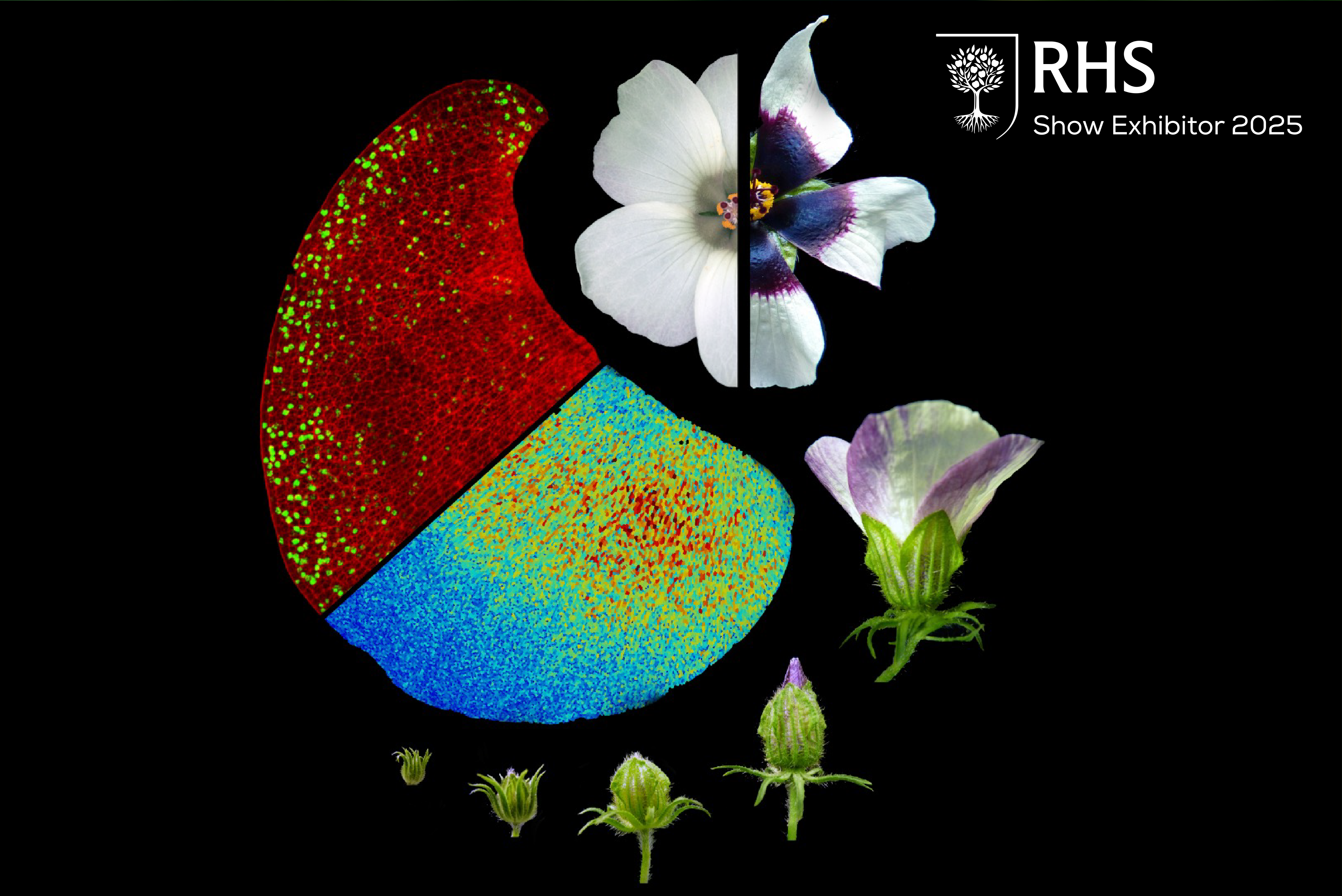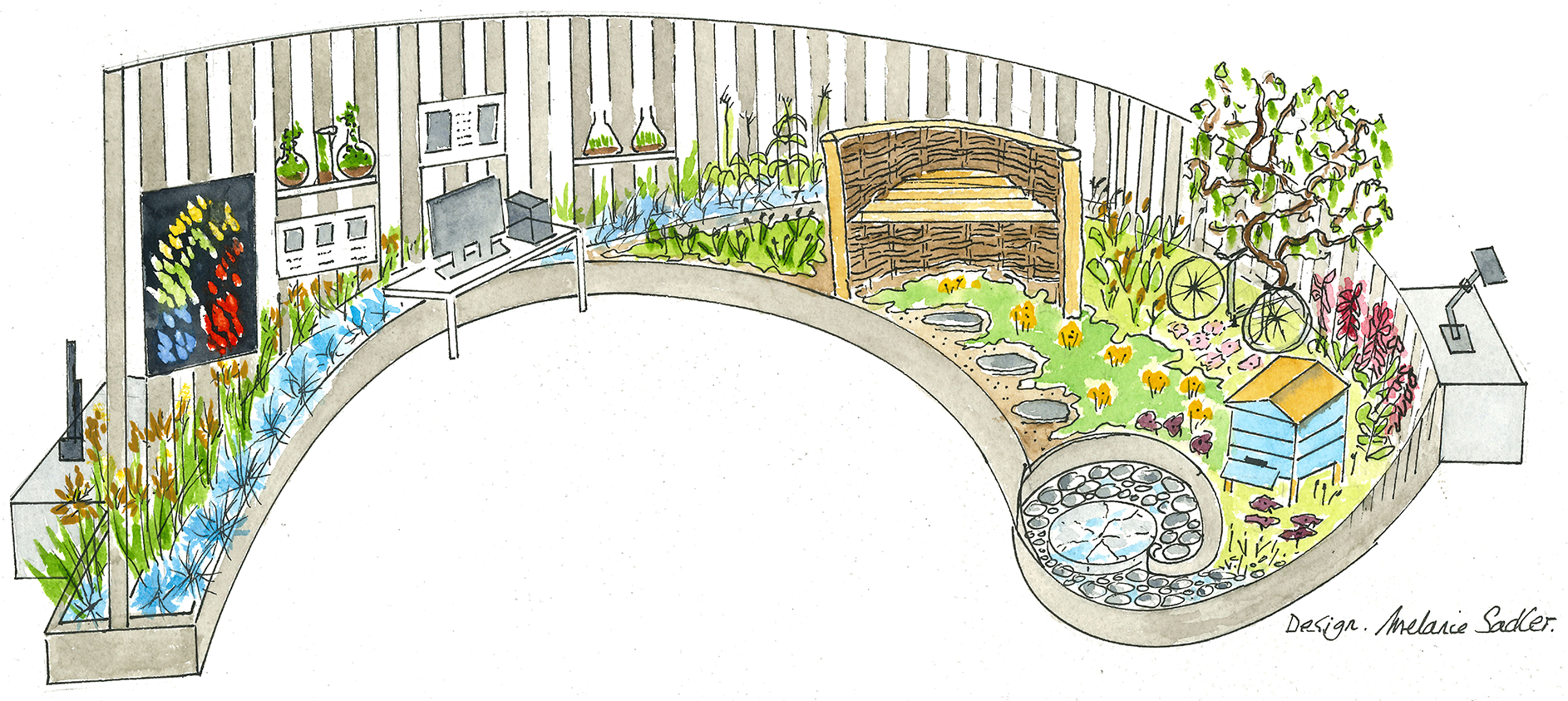
The Sainsbury Laboratory at the University of Cambridge is thrilled to announce its participation in the 2025 RHS Chelsea Flower Show, where it will unveil an interactive plant science exhibit, Blooming Numbers, as part of the new GreenSTEM section highlighting research, innovation and technologies.
The exhibit will take visitors on an interactive journey through the latest discoveries in quantitative plant science research beginning with the flower and exploring everything from molecular biology and genetics to advanced imaging, computational modelling, and the role of mathematics in shaping our understanding of plants.
Dr Edwige Moyroud, who heads a research group at the Sainsbury Laboratory studying pattern formation in petals, said the exhibit will provide an insight into how researchers study plants in the 21st century: “We are excited to share our passion for plant science with the public at the RHS Chelsea Flower Show. Plants are both incredibly familiar but also completely alien to us. Although we depend on plants for our survival, we still know so little about them!
“It’s a fantastic time to be a scientist as we now have access to cutting-edge tools like computational modelling, machine learning, biosensors and experimental design that are transforming the way we study plants. Our exhibit is an opportunity to not only showcase the amazing discoveries of our research but also to ignite a sense of wonder about the complexity and beauty of plants – hopefully, visitors will never look at plants the same way again.”
The exhibit, Sainsbury Laboratory Cambridge: Blooming Numbers, will present visitors with an opportunity to explore plant life through interactive activities.
Highlights include:
- Photographing your favourite flower under a scanning electron microscope
- Using a mini-UV camera to see flowers like a bee
- Learning about a research project to create a 4D virtual flower
- Discovering how plants move without muscles
- Exploring how flowers use an invisible blueprint to attract pollinators
- Hearing about new insights into the specialised floral structures of grasses
- Investigating how noisy genes could help plants survive extreme conditions
- Observing plant hormones orchestrating growth in real time through advanced biosensors
- Building your own plant mini-genome to explore plant evolution through computer modelling
Dr Sarah Robinson leads a research group exploring the role of biomechanics in plant growth and development: “I am thrilled to share some of the incredible microscopy work we do at the Sainsbury Laboratory. Our advanced microscopy facilities are uncovering previously undetectable plant hormones that regulate growth, as well as revealing how mechanical properties and stresses in plant cells and tissues influence development.”
The development of complex floral organs in grasses directly impacting plant fitness and yield. Image by Madelaine Bartlett and Bartlett Research Group.
Dr Madelaine Bartlett’s research team is investigating the molecular underpinnings of plant diversity – with a focus on grasses: “Often the overlooked flower, grasses have specialised flowers that have helped them dominate natural and agriculture ecosystems the world over. The form and function of specialised floral structures in grasses, including in cereals, is fascinating, with the development of complex floral organs directly impacting plant fitness and yield. I’m looking forward to sharing just how fascinating and unique grass flowers are with visitors to the RHS Chelsea Glower Show and discussing the diversity of research happening at the Sainsbury Laboratory.”
Illustration of the planned Sainsbury Laboratory Cambridge Blooming Numbers exhibit for the RHS Chelsea Flower Show 2025. A Fibonacci spiral will be the central element of our exhibit and guide visitors through a journey along the plant life-cycle starting with THE FLOWER. Illustration by Melanie Sadler.
The Sainsbury Laboratory Cambridge: Blooming Numbers exhibit is made possible through the generous support of The Gatsby Charitable Foundation, sponsorship from Leica Microsystems and in collaboration with Oakington Garden Centre and the Department of Engineering at the University of Cambridge.
Join us at the RHS Chelsea Flower Show in the Great Pavilion 20-24 May 2025.
Media enquiries
For more information or media inquiries, please contact: Kathy Grube, Communications Manager, Sainsbury Laboratory, University of Cambridge
Email: katherine.grube@slcu.cam.ac.uk
Phone: +44 (0) 12237 61152
About the Sainsbury Laboratory
The Sainsbury Laboratory at the University of Cambridge is dedicated to advancing plant science through cutting-edge research that explores the genetic, molecular, and ecological processes that shape plant life.
Located within the Cambridge University Botanic Garden, our state-of-the-art research facility opened in 2011 and was made possible through a generous donation and ongoing core funding from The Gatsby Charitable Foundation.
We adopt a multidisciplinary approach to investigate the highly plastic and robust regulatory systems underlying plant growth and development, examining them at scales from the molecular level to ecosystem level, using cutting-edge techniques and technologies.
We bring together specialists in biological, physical, and mathematical sciences. This interdisciplinary approach is essential for understanding the complex dynamic and self-organising properties of plants. Quantitative plant science enables us to explore and deepen our fundamental understanding of how plants function.








